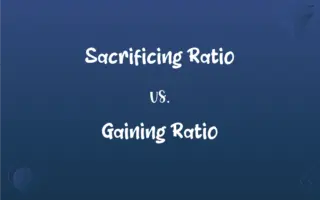Adjective vs. Determiner: What's the Difference?
Edited by Aimie Carlson || By Janet White || Published on December 18, 2023
An adjective describes or modifies a noun, adding details like color, size, and shape, while a determiner specifies and identifies nouns, indicating definiteness, quantity, or possession.

Key Differences
Adjectives provide descriptive detail to nouns, such as color, size, or other qualities. Determiners, on the other hand, function to specify nouns, indicating things like quantity or possession.
An adjective can describe aspects like shape, age, color, origin, or material. Determiners include words like articles (the, a, an), demonstratives (this, that), possessives (my, your), and quantifiers (some, many).
Adjectives are used to enhance the noun by adding information. Determiners are used to point out or refer to nouns, and they are essential for the clarity of noun phrases.
Examples of adjectives include words like 'green', 'tall', 'beautiful'. Determiners are words such as 'the', 'these', 'every', which precede nouns in sentences.
Adjectives can appear before or after nouns they describe. Determiners always precede the noun or the adjective that modifies the noun.
ADVERTISEMENT
Comparison Chart
Function in a Sentence
Describes or modifies a noun.
Specifies, identifies, or quantifies a noun.
Types of Words Included
Descriptive words like 'blue', 'old'.
Articles, possessives, demonstratives, quantifiers.
Position Relative to Noun
Before or after the noun.
Always before the noun.
Examples
'The blue sky', 'A happy child'.
'The dog', 'Some apples'.
Contribution to Meaning
Adds qualitative detail to the noun.
Clarifies or limits the noun's reference.
ADVERTISEMENT
Adjective and Determiner Definitions
Adjective
Describes size, color, shape, or other attributes.
He bought a large, round table.
Determiner
Specifies quantity or definiteness of a noun.
She has three cats.
Adjective
Adds detail or expresses a quality of a noun.
She wore a red dress to the party.
Determiner
Identifies specific or general items.
Those cookies are delicious.
Adjective
A word that describes a noun or pronoun.
The beautiful garden was full of flowers.
Determiner
Demonstrates possession or belonging.
My brother is an artist.
Adjective
Provides more information about a noun's characteristics.
They adopted a playful puppy.
Determiner
Clarifies the noun's scope in a sentence.
Every student received a certificate.
Adjective
Can compare nouns (comparative, superlative forms).
This is the oldest building in the city.
Determiner
A word that introduces a noun, indicating reference.
The book on the table is mine.
Adjective
The part of speech that modifies a noun or other substantive by limiting, qualifying, or specifying and distinguished in English morphologically by one of several suffixes, such as -able, -ous, -er, and -est, or syntactically by position directly preceding a noun or nominal phrase.
Determiner
One that determines.
Adjective
Any of the words belonging to this part of speech, such as white in the phrase a white house.
Determiner
(Grammar) A word belonging to a group of noun modifiers, which includes articles, demonstratives, possessive adjectives, and words such as any, both, or whose, and, in English, occupying the first position in a noun phrase or following another determiner.
Determiner
(grammar) A member of a class of words functioning in a noun phrase to identify or distinguish a referent without describing or modifying it.
Definite articles and indefinite articles are types of determiners.
Determiner
(grammar) A dependent function in a noun phrase marking the NP as definite or indefinite. This function is usually filled by words in the determinative class but may be filled by other elements such as a genitive pronoun.
Determiner
Something (some input factor, a nonsentient agent) that determines, or helps someone to determine, something else.
In quality management, the determiners of quality sometimes differ across use cases.
Determiner
Someone (a sentient agent) who determines; a decider of a disposition.
He is the determiner [usually referring to God (in theological contexts) and job roles (in administrative contexts)]
Who is the determiner? [administratively or theologically]
Determiner
One who, or that which, determines or decides.
Determiner
An argument that is conclusive
Determiner
One of a limited class of noun modifiers that determine the referents of noun phrases
Determiner
A determining or causal element or factor;
Education is an important determinant of one's outlook on life
FAQs
What is an adjective?
An adjective is a word that describes or modifies a noun or pronoun, such as 'big', 'blue', or 'fast'.
What is an adjective phrase?
An adjective phrase is a group of words that includes an adjective and functions as a single modifier, like 'extremely happy'.
Are there different types of adjectives?
Yes, including descriptive, quantitative, demonstrative, possessive, and interrogative adjectives.
Can adjectives be used in comparative forms?
Yes, many adjectives can be used in comparative forms, like 'bigger', 'smaller', or 'more beautiful'.
What is a determiner?
A determiner is a word that introduces a noun and indicates reference, quantity, or possession, such as 'the', 'a', 'some', 'this', or 'my'.
How do adjectives work in a sentence?
Adjectives typically come before the nouns they modify, e.g., 'a red apple', but can also follow linking verbs, e.g., 'The apple is red.'
Can adjectives describe pronouns?
Yes, adjectives can modify pronouns, like in 'She is tall.'
What is an adjective clause?
An adjective clause is a dependent clause that functions as an adjective, e.g., 'The book, which was red, is mine.'
Do adjectives have a fixed position in a sentence?
Mostly, they precede the noun, but some can follow the noun or the verb.
What role do determiners play in a sentence?
Determiners help specify which noun is being referred to and often signal the presence of a noun phrase.
What is the difference between definite and indefinite articles?
'The' is a definite article, used for specific nouns, while 'a' and 'an' are indefinite articles, used for non-specific nouns.
Are there exceptions to the use of determiners?
Yes, in some cases, like with proper nouns or plural countable nouns when speaking generally, determiners may not be used.
Can determiners change the meaning of a sentence?
Yes, the choice of determiner can alter the meaning, e.g., 'a book' vs. 'the book'.
How do adjectives enhance writing?
Adjectives add detail and depth to writing, making descriptions more vivid and specific.
Can two adjectives be used together?
Yes, multiple adjectives can modify the same noun, sometimes separated by commas, e.g., 'a small, cozy house'.
How do possessive pronouns relate to determiners?
Possessive pronouns like 'my', 'your', 'his', 'her', 'its', 'our', and 'their' function as determiners when they modify nouns.
Are articles considered determiners?
Yes, articles ('a', 'an', 'the') are a type of determiner.
Can determiners be omitted in a sentence?
In some cases, especially in informal speech or certain languages, but usually, they are needed for clarity and grammatical correctness.
Do determiners always precede adjectives?
Typically, yes. For example, 'the big house', not 'big the house'.
Can numbers function as determiners?
Yes, numbers like 'one', 'two', 'three' can act as determiners indicating quantity.
About Author
Written by
Janet WhiteJanet White has been an esteemed writer and blogger for Difference Wiki. Holding a Master's degree in Science and Medical Journalism from the prestigious Boston University, she has consistently demonstrated her expertise and passion for her field. When she's not immersed in her work, Janet relishes her time exercising, delving into a good book, and cherishing moments with friends and family.
Edited by
Aimie CarlsonAimie Carlson, holding a master's degree in English literature, is a fervent English language enthusiast. She lends her writing talents to Difference Wiki, a prominent website that specializes in comparisons, offering readers insightful analyses that both captivate and inform.







































































